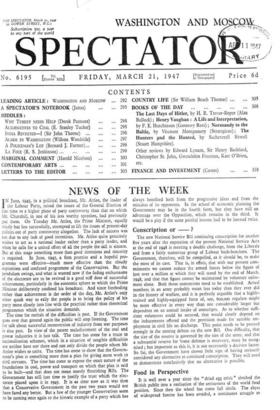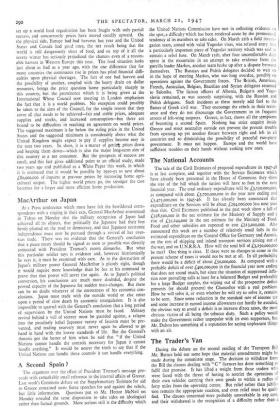Food in Perspective
It is well over a year since the " dried egg crisis " shocked the British public into a realisation of the seriousness of the world food position. Since then the wheel has come full circle. The abyss of widespread famine has been avoided, a continuous struggle to set up a world food organisation has been fought with only partial success, and concurrently prices have moved steadily upward. On the physical side, Europe had bad harvests last year and the United States and Canada had good ones, the net result being that the world is still dangerously short of food, and on top of it all the severe winter has seriously prejudiced the chances even of a reason- able harvest in Western Europe this year. The food situation looks just about as bad as a year ago, with the one difference that for many countries the continuous rise in prices has piled financial diffi- culties upon physical shortages. The fact of one bad harvest and the possibility of another, coupled with the heavy drain on dollar resources, brings the price question home particularly sharply to this country, but the prominence which it is being given at the International Wheat Council now meeting in London emphasises the fact that it is a world problem. No exception could possibly be taken to the aims of the Council, for the simple reason that they cover all that needs to be achieved—fair and stable prices, adequate supplies and stocks, and increased consumption—but there are bound to be difficulties in reaching an agreement on world prices. The suggested maximum is far below the ruling price in the United States and the suggested minimum is considerably above what the United Kingdom might expect to pay if supplies become easy in the next two years. In short, it is a matter of getting prices down and keeping them down—which is also the major long-term aim of this country as a net consumer. But the prospects of success are small, and this fact gives additional point to an official study, made two years ago and published as a White Paper this week, in which it is estimated that it would be possible by 1950-51 to save about £80,000,000 of imports at pre-war prices by increasing home agri- cultural output. The higher world prices go, the stronger the case becomes for a larger and more efficient home production.



































